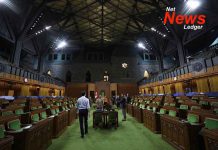
THUNDER BAY – Politics – Stephen Harper’s Conservatives, the very people who claim they are the best political choice to put behind the wheel of Canada’s economy during difficult times, appear to be driving our economic bus over a fast approaching cliff.
Stephen Harper’s Conservervatives
The warning signs are becoming more numerous and more severe. The Canadian economy is reeling from a skilled worker shortage and structural unemployment, and is now falling behind several other industrialized countries when it comes to economic growth. What’s worse is that many other serious warning signs, specifically the high level of consumer debt and an overpriced housing market, also originate from within Canada. Outgoing Bank of Canada Governor Mark Carney has repeatedly said throughout his tenure that, aside from a downturn in other major economies, excessive consumer and household debt are the largest domestic threats to Canada’s economic well-being. The real problem though is the potential of a ‘superstorm’ in the Canadian economy; a faltering domestic economy with its own serious challenges, combined with any number of possible economic disruptions in our major export markets like Europe, China, and the United States.
Unfortunately, new domestic economic data released this week suggests that our debt load has never been higher and that our housing market is badly weakening. The new information on consumer debt released this week by Statistics Canada found that average household debt in Canada now stands at a record 165% of our annual income Put another way, for every $1 we earn today we are on average spending $1.65. In short, Canadians are spending and borrowing too much and saving too little which leaves our households vulnerable if an income earner loses his or her employment, and leaves the broader economy at greater risk if there are significant job losses as consumers will then be forced to reduce their discretionary spending and pay down this personal debt. Consumer debt including credit cards, loans, and lines of credit, but excluding mortgages stood at $477 billion at the end of 2012, so having to pay back as little as 10% of this debt will lead to a decline in spending and investment of about $47 billion throughout our economy.
The housing market in Canada is also slowing dramatically. The real debate among economists now is whether or not the Canadian housing market is merely overpriced or in something called an asset ‘bubble.’ The distinction is a significant one, as overpriced markets can often handle a small adjustment in pricing over time a longer time, but a market with a bubble risks rapid and unpredictable prices declines from a sharp peak. The effect on the economy of a country with an overpriced market, which experiences say a 10% adjustment over a 5 to 8 year period can be minimal, but the effects of a bubble bursting, say a 20-30% price decline over 3 to 5 years can be dramatic and lead to a deep and prolonged recession. The last recession in the United States, which was the longest and deepest since the Great Depression, is the best example of what can happen when housing and debt bubbles simultaneously ‘pop.’
It’s not pretty.
So what is happening in Canada’s housing market? Of this, there is little consensus. On the ‘dovish’ side are analysts at some of the major Canadian banks, the Finance Department, and the Canada Mortgage and Housing Corporation (CMHC) who all see the market as overvalued, but stable and unlikely to experience a major price adjustment in a short period of time. On the ‘hawkish’ side of things are analysts from international credit rating agencies Fitch and Moody’s, the International Monetary Fund (IMF), Organization for Economic Cooperation and Development (OECD), and Capital Economics who all see a de-facto bubble situation and steep downward price adjustments in the medium term.
The doves think the average housing price, which has declined each month for five months in a row, is moderating as planned but the hawks think that the housing price declines we’ve seen when coupled with declines in both housing starts and sales is the start of something more as the bubble pops or deflates in the short to medium term. It’s worth noting that none of these analysts see prices rising as they have in the past, and all are seeing some sort of price decline over the medium term.
An over indebted population and overheated housing market are among the most significant threats to the Canadian economy today, and they are ‘Made in Canada’ problems that have come to be under the economic management and stewardship of Stephen Harper’s Conservatives. After eight years of “Economic Action Plans” Canadians have little more than excessive household debt, a weakening housing market, massive federal deficits and a struggling economy to show for it. Some plan.
John Rafferty MP
Thunder Bay Rainy River







